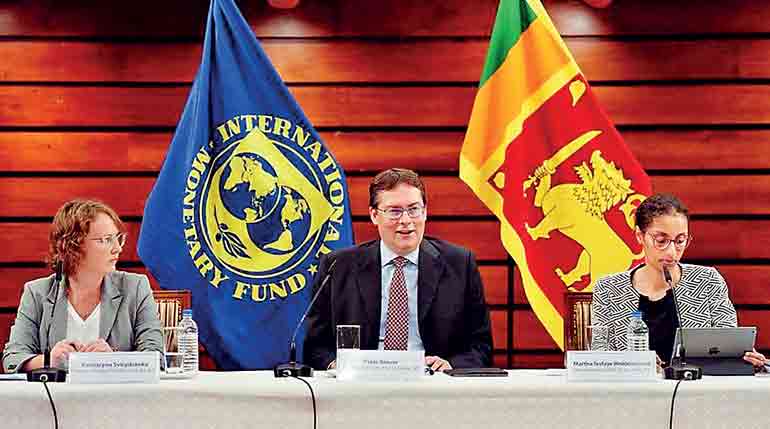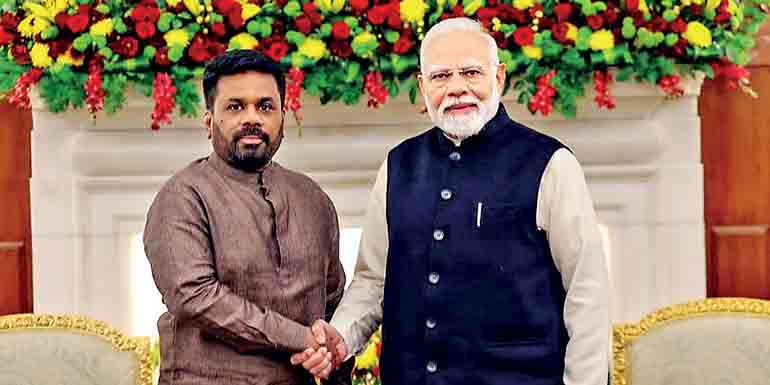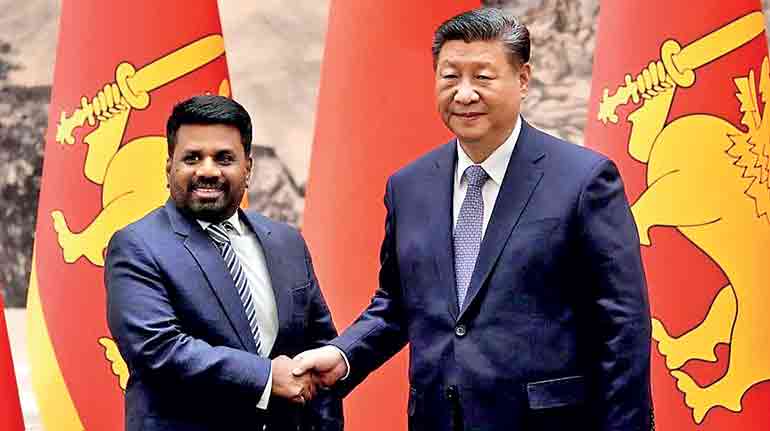Saturday Feb 21, 2026
Saturday Feb 21, 2026
Tuesday, 16 September 2025 02:41 - - {{hitsCtrl.values.hits}}

The IMF senior mission chief Peter Breuer, presenting the approval of the third review of Sri Lanka’s $ 2.9 b bailout (Source: Al Jazeera)
When the National People’s Power (NPP) Government assumed office in September 2024, it inherited more than a fragile economy and the hopes of a disillusioned citizenry. It also assumed responsibility for steering Sri Lanka through arguably the most significant moment of international recalibration since the end of the Cold War. The global order is shifting once again, with China and Russia presenting themselves as alternatives to Western dominance, and smaller states forced to reposition themselves in ways that are both delicate and strategic.
 Signals of a profound reordering of the international system have been apparent for some time. Early indications of this impending shift can be, perhaps, traced to the rise of far-right nationalism and systemic dissatisfaction that emerged in many parts of the world over the past decade.
Signals of a profound reordering of the international system have been apparent for some time. Early indications of this impending shift can be, perhaps, traced to the rise of far-right nationalism and systemic dissatisfaction that emerged in many parts of the world over the past decade.
For Sri Lanka, however, the challenge is especially acute. Two of its most important traditional partners in India and China are themselves locked in a delicate rivalry. The former is itself hoping to navigate turbulence in the international arena with respect to its diplomatic partners — perhaps an unwelcome shock to its otherwise meticulously crafted and finely-toed foreign policy. The latter is perhaps viewed as the ‘order in the wings’, seeking to champion a seemingly unorthodox brand of revisionism in the world order. At the same time, Sri Lanka cannot disregard the West, whose financial institutions and diplomatic weight remain essential for its economic and foreign policy objectives.
The central question, then, is whether the NPP Government is exercising strategic foresight in navigating this inflection point, or whether it is reacting to events as they come.
The international context: A multiplex world in transition
The global system today is neither bipolar, as during the Cold War, nor unipolar, as after 1991. Scholars such as Amitav Acharya describe the emerging order as “multiplex,” in which power is dispersed across multiple regions rather than concentrated in Washington, Moscow, or Beijing. While great powers retain distinct gravities, middle and small states have greater room for manoeuvre, yet also face heightened risks because alignments are fluid and institutions less predictable.
China and Russia are actively building a counterweight to the Western-led system, using organisations such as the Shanghai Cooperation Organization (SCO) and initiatives like the Belt and Road. This represents not only economic competition but also ideological rivalry, with debates over governance models, sovereignty, and global leadership shaping the discourse. Whose distinct flavour of norms will enrich the international palate?
For Sri Lanka, this context complicates neutrality. Non-alignment, a core attribute of its foreign policy, may remain possible, but every choice, symbolic or material, is amplified within a contested international landscape. Each diplomatic move sends signals, and the absence of visible presence can be interpreted as a statement in itself.
Sri Lanka and China: Alignment without full commitment
Since assuming office, the NPP Government has made clear that China remains a valued partner. President Anura Kumara Disanayake’s state visit to Beijing in January 2025 secured major investments, including a multibillion-dollar refinery deal. The joint statement following the visit reaffirmed Sri Lanka’s commitment to the One China Principle. It also emphasised deepening cooperation under the Belt and Road Initiative and expanding people-to-people ties. Observers note that a Government in Colombo that is ideologically aligned with China would reinforce Beijing’s expectations for strengthened cooperation.

President Anura Kumara Disanayake with Prime Minister Narendra Modi (Source: @narendramodi on X)
Despite this, Sri Lanka was absent at the SCO summit in Tianjin. Foreign Minister Vijitha Herath publicly acknowledged Xi Jinping’s initiatives on global governance and development in a single statement online. The phrasing — “took note positively” — was notably cautious. Sri Lanka’s absence at the summit, despite being a Dialogue Partner of the SCO since 2010, was significant. While China is treated as a pillar of Sri Lankan foreign policy, absence from multilateral forums may undermine credibility and send mixed signals to diplomatic partners.
The pattern reflects an implicit hedging strategy. Bilateral relations with China are cultivated aggressively through investment and political affirmation, yet multilateral engagement is minimal. This dual approach may provide short-term benefits but risks signalling inconsistency to other global actors.
Sri Lanka and India: Crisis trust and strategic pragmatism
Relations with India illustrate a different pattern. During Sri Lanka’s 2022 crisis, India provided urgent economic support, from fuel shipments to credit lines. Though the NPP was not in power at the time, the political memory of Indian assistance has clearly shaped its strategic outlook.
Traditionally, Sri Lanka has aligned its foreign policy with India at key moments. The Yahapalana Government (2015–2019) worked closely with New Delhi, emphasising democratic governance, maritime cooperation, and alignment with India’s regional priorities. Under the Rajapaksas, the pendulum swung toward China. The NPP may now seek a recalibrated balance, showing warmth toward India without closing the door to China.
This recalibration is evident in early diplomatic exchanges. On India’s part, even before the 2024 election, NPP leaders were invited to New Delhi, signalling that India regarded them as viable partners. Since then, the tone has remained cordial. While public rhetoric emphasises cultural bonds, the underlying rationale is strategic pragmatism: India is an indispensable neighbour whose goodwill can stabilise Sri Lanka’s economy and regional standing. Efforts to enhance economic cooperation appear reciprocal to the support India provided during Sri Lanka’s most vulnerable period.
However, Sri Lanka has shown hesitancy on issues of Indian political interest. For instance, the Government has remained reticent regarding the conduct of Provincial Council elections, a matter India consistently urged Colombo to advance. Though the Government has stated that polls will be held next year following the conclusion of a long-standing delimitation process, it has prevaricated on whether it will commit to strong devolution of power as part of post-conflict reconciliation efforts. This illustrates the tension between domestic politics and regional expectations, a balancing act that defines Sri Lanka’s strategic calculus.
The West: A third dimension
Despite shifts in the international system, Sri Lanka cannot neglect the West. Multilateral institutions such as the IMF remain critical for economic recovery. Western markets matter for trade, and Western powers influence international bodies that shape debt restructuring and investment flows. In light of the reality of the recent Trump administration tariffs, Sri Lanka must also be cognisant of its economic interests.
Under the NPP, engagement with the West has been quieter. There has been no overt pivot, nor an attempt to reframe relations beyond transactional needs. This may reflect caution, given the ideological distance between the NPP’s domestic platform and the liberal economic values often promoted by Western partners.
By underplaying Western engagement, Sri Lanka risks narrowing its diplomatic options. A focus solely on India and China ignores the triangulation needed to maximise leverage. Without abandoning ties to either Asian power, the NPP could cultivate Western relations through targeted cooperation on climate resilience, renewable energy, or governance initiatives. This would diversify partnerships without deepening dependency.
Is there a grand strategy?
The central analytical question is whether NPP foreign policy reflects a coherent strategy or is reactive.
Implicitly, the Government appears to practice “hedging” — a classic small-state approach involving engagement with multiple great powers without exclusive alignment. Ties with China secure investment, ties with India maintain regional goodwill, and quiet relations with the West preserve access to financial institutions and soft power.

President Anura Kumara Disanayake and President Xi Jinping (Source: Reuters)
However, the pattern often appears ad hoc. Strong statements in Beijing contrast with muted presence in multilateral forums. Indian relations remain shaped by past crises rather than structured initiatives. Western engagement is not proactive.
From the lens of international relations theory, Sri Lanka oscillates between bandwagoning with China on certain principles, such as on human rights and values for the international system, and balancing with India and the West. While such oscillation is common for small states, what distinguishes strategy from reaction is coherence. At present, coherence is limited.
Adequacy of NPP navigation
The NPP Government has demonstrated base political instinct. It has avoided alienating China or India and has acknowledged Western economic realities. Yet instinct is not foresight.
If adequacy is judged by survival, the NPP’s diplomacy is sufficient. Sri Lanka has avoided open conflict with major partners. But adequacy in a multiplex world requires more: presence, consistency, and the ability to shape opportunities rather than merely respond. On these counts, the record is mixed.
Conclusion
The NPP Government is guiding Sri Lanka through a historical turning point. It has embraced China for investment and political alignment, reaffirming strategic projects and principles. It has leaned on India, acknowledging its role during the economic crisis and maintaining cordial ties. It has kept a narrow but necessary channel to the West.
Yet the overall picture is one of partial coherence. Strong bilateralism with China is not matched by multilateral engagement. Goodwill with India has yet to translate into structured cooperation. Engagement with the West remains hesitant.
The analysis suggests that the NPP is hedging in practice but lacks a clearly communicated, proactive strategy. The task ahead is to turn instinct into strategy, symbolism into presence, and survival into influence. In essence, it is to understand which direction the compass points, and why.
For a small state at the crossroads of the Indian Ocean, the difference between reaction and strategy may determine whether Sri Lanka remains an observer of the new global order or is able to shape its own role and interests within it.
(The author is a political analyst, and lecturer in international relations, political economy and democracy and democratisation.)